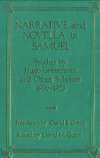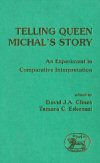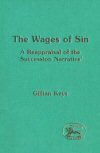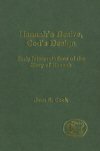Samuel Collection (4 vols.)
Digital Logos Edition
Overview
The books of Samuel in the Old Testament not only record events of Israel’s history, but also offer insight into the literary and history traditions of the time. This collection focuses on the key characters and stories of 1 and 2 Samuel, including David, Michal, Samuel, as well as the theological and structural significance of the passages. The volumes document the many different interpretations of these Old Testament texts, including succession narrative and critical historicism. They address issues such as the difference between historical recording and storytelling, the place of women in the narratives, literary structure, cultural ramifications, character roles, and parallel passages in the New Testament. This is an important collection on Hebrew literature and theology, providing an academic, yet clear understanding into this recording of Israel’s story.
Samuel Collection (4 Vols.) will be of interest to professors, students, and anyone wanting to learn more about the stories and key characters of Israel. Each volume has indexes, bibliographies, notes, cross-references, lists of abbreviations, and author lists.

Key Features
- In-depth discussion of the theological and structural significance of the books of Samuel
- Includes a variety of topics and international scholars
- Each volume contains indexes and bibliographies to guide research
Individual Titles
- Narrative and Novella in Samuel: Studies by Hugo Gressmann and Other Scholars, 1906-1923, edited by David M. Gunn
- Telling Queen Michal's Story: An Experiment in Comparative Interpretation, edited by Philip R. Davies & David J.A. Clines
- The Wages of Sin: A Reappraisal of the 'Succession Narrative', by Gillian Keys
- Hannah's Desire, God's Design: Early Interpretations of the Story of Hannah, by Joan E. Cook

This is a collection of essays by an early twentieth century group of scholars on the books of Samuel, focusing on literary structure. The essays chosen represent a shift in biblical study: from pure historicism to literary analysis. Some of the topics covered are literary type, historical value, and narrative art.
Essays included:
- “The Oldest History Writing in Israel,” Hugo Gressmann
- “The Literary Type and Historical Value of 2 Samuel 15-20,” Wilhelm Caspari
- “The Novella of Judah and Tamar and Other Israelite Novellas,” Bernhard Luther
- “Narrative Art in the Books of Samuel,” Alfons Schultz
David M. Gunn, Ph.D., is professor of Religion at Texas Christian University.

This book, an anthology of previously published writing about Michal together with some new and original essays, is something of an experiment. Its purpose is to provide readers with raw materials for developing their own reading of the Michal story. It does not offer a unified portrait of this biblical character, but rather invites readers to form their own assessment interactively with these readings of the Michal story. At the same time, this book presents some systematic guidance for coping with these divergent interpretations of the complex and tantalizing figure of Michal.
Essays Included:
- "Michal Observed: An Introduction to Reading her Story," David J.A. Clines
- "Characterization and the Art of Reticence," Robert Alter
- "The Legal Background to the Restoration of Michal to David," Zafrira Ben-Barek
- "Characterization in Biblical Narrative: David's Wives," Adele Berlin
- "Michal in the Books of Samuel," W.G. Blaikie
- "The Fortune of King David/The Fate of Queen Michal: A Literary Critical Analysis of 2 Samuel 1-8," Richard G. Bowman
- "2 Samuel 6," Walter Brueggemann
- "X, X ben Y: Personal Names in Hebrew Narrative Style," David J.A. Clines
- "The Story of Michal, Wife of David, in its Sequential Unfolding," David J.A. Clines
- "King Saul's Daughter—David's First Wife," Edith Deen
- "The Grace of God," Robert C. Ehle
- "Michal in Hebrew Sources, " Tamara C. Eskenazi
- "Michal," W. Ewing and J.E.H. Thomson
- "Murder They Wrote: Ideology and the Manipulation of Female Presence in Biblical Narrative," J. Cheryl Exum
- "Michal bat Shaul," Shoshanna Gershenzon
- "The Family of David," Louis Ginzberg
- "Michal," D. Harvey
- "Michal," G.P. Hugenberger
- "Michal: A Vessel for the Desires of Others," Abbey Pope Kapelovitz
- "Michal," Abraham Kuyper
- "Michal: The Woman who Tricked her Father," Herbert H. Lockyer
- "Michal," Norah Lofts
- "Michal and her Sisters," Peter D. Miscall
- "A Multivoiced Look at the Michal Narratives," Robert Polzin
- "Three Wives," Maurice Samuel
- "The Princess and the Shepherd," Adin Steinsaltz
- "Michal," N.J.D. White
- "Michal, Saul's Daughter" Alexander Whyte
David Clines is Professor of Biblical Studies and Head of Department in the University of Sheffield.
Tamara Eskenazi is Professor of Hebrew Bible at Hebrew Union College, Jewish Institute of Religion, Los Angeles.

Keys examines the “succession narrative,” a long-held literary and theological viewpoint on the life of David. She gives an in-depth introduction to the concept and its key thinkers through the twentieth century. Key then brings the different views into dialogue, along with her own theories. Giving careful attention to the key passages in 1 Kings and 2 Samuel, she presents a readable analysis of the succession narrative and David’s reign. Keys includes cross-references, translations, notes, indexes, and a bibliography.
Gillian Keys, Ph.D., lives in Ireland.

This study analyzes the biblical personage Hannah as a literary entity, to illustrate her uniquely significant place in the traditions of Israel as the mother of Samuel and thus of the reform of the priesthood, the creation of the monarchy, and the teacher of all Israel. There are three interweaving themes: first, the literary issue of the barren mother type scene; second, the theological theme of divine guidance and human initiative; and third, the perspectives of early biblical interpretation. The study develops around four works: the Hannah narrative in 1 Samuel 1-2, Pseudo-Philo's Biblical Antiquities, the Targum of the Prophets, and the Infancy Narrative in Luke 1-2.
Joan E. Cook is Associate Professor of Sacred Scripture at Washington Theological Union, Washington, DC.
Product Details
- Title: Samuel Collection (4 Vols.)
- Publisher: Sheffield Academic
- Volumes: 4
- Pages: 835